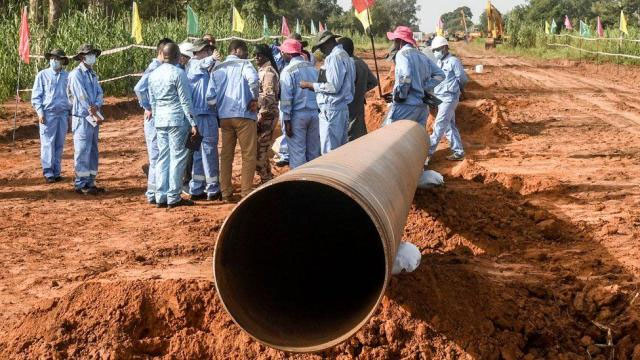
Photo Credit: AFP
Niger's junta has officially confirmed that rebels were responsible for damaging an oil pipeline that carries crude oil to neighboring Benin. The Patriotic Liberation Front, a group fighting for the release of former president Mohamed Bazoum, who was overthrown in a coup last July, claimed responsibility for the attack earlier this week. The incident has raised concerns about the stability of the newly opened 2,000-kilometer (1,243-mile) pipeline, which links Niger's Agadem oilfield to Benin's coast.
The pipeline, formally launched in November, was intended to make Niger an oil-exporting country with significant economic implications for both nations. However, relations between Niger and Benin have soured, and the situation escalated following last year's coup. Regional sanctions were imposed on Niger, affecting the pipeline's future. In February, the regional bloc Ecowas lifted the sanctions, allowing borders to reopen. Benin, eager to resume imports and exports, faced challenges due to Niger's refusal to reopen its land border with Benin. Niger accused Benin of hosting French forces that were allegedly training others to destabilize Niger, further straining relations.
China stepped in to ease tensions, enabling Niger to export its first batch of crude oil through Benin at the end of May. However, the dispute persisted. Earlier this month, five Niger nationals were arrested at an oil port in Benin on impersonation charges, and a second crude shipment was reportedly aborted. The Nigeriens, who worked for the Chinese oil firm operating the pipeline, were expelled and flown to Niamey.
In the midst of these tensions, the oil pipeline suffered damage in Niger's southern Zinder region, with an oil spill extending into the bush. The junta vowed to apprehend and prosecute the "malicious individuals" responsible for sabotaging part of the pipeline. Public prosecutor Ousmane Baydo confirmed that they knew which group was behind the attack and had claimed responsibility.
Despite these challenges, the pipeline remains vital for both Niger and Benin. It is crucial for their economies, and any further disruptions could have significant consequences. As the situation unfolds, international attention remains focused on the delicate balance between political stability, economic interests, and regional relations in West Africa.
In conclusion , Niger's confirmation of anti-junta rebels damaging the oil pipeline underscores the complex dynamics at play in the region. The pipeline's fate hangs in the balance, and the actions of various actors will determine its future impact on Niger and Benin's economies.

















